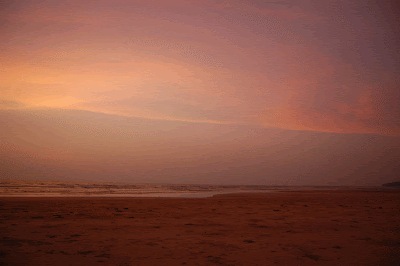Turning a corner in a story and chancing upon a perfect phrase, an unexpected image, a dash of color, a finely crafted sentence with not an extra syllable, the apt word selected from among so many approximations.
In most science fiction, people communicate without words. They see into each other, feel into each other, without a word said. Is a lot of science fiction a longing for real connection?
In the meanwhile, when all you have is words, you tiptoe among them in wonder, barefoot, stopping to reverently gaze at a face carved out of dense stone, the incommunicability of our experiences through language.
........................................................................
Tango"The sound of the tango is the sound of a rose weeping in the sunset,' he writes. 'It is a carnal wound, one that requires all the agility of our youth to stitch it up again. All dance is ephemeral, but the tango, for all its dramatic frenzy, is doubly so, because underlying it is the eternal langour of violins. The tango is a flimsy fabric, flung proudly about, to hide the nakedness of an evening's despair."
Page 224, 'Tangos' from 'Etudes', Aseem Kaul
.....................................................................
Heat"The two men stepped away from the road, marveling. The heat created a form of synaesthesia. It was loud, vulgar, it towered over them, its weight pressed down on their heads, and it leaped up from the ground and struck their faces. Who would believe that a photon had no mass?"
Page 320, 'Solar', Ian McEwan
..........................................................................
Heaven, an IroquoisBut that's not all a citysky can do. It can go purple and keep an orange heart so the clothes of the people on the streets glow like dance-hall costumes. I have seen women stir shirts into boiled starch or put the tiniest stitches into their hose while a girl straightens the hair of her sister at the stove, and all the while heaven, unnoticed and as beautiful as an
Iroquois, drifts past their windows....
Page 36, 'Jazz', Toni Morrison
..........................................................................
Redolent".The sun went and it was dark. He sat beside her in the comfortable darkness and they listened, contentedly, to the sounds of Africa settling down for the night. A dog barked somewhere; a car engine raced and then died away; there was a touch of wind, warm dusty wind, redolent of thorn trees."
Page 234, 'The No.1 Ladies' Detective Agency', Alexander McCall Smith
Redolent
1: exuding fragrance : aromatic
2 a : full of a specified fragrance : scented
b : evocative, suggestive





















